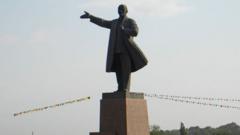Oleg Gordievsky, who famously transitioned from being a senior K.G.B. officer to a double agent for British intelligence during the Cold War, has died at the age of 86 at his home in Godalming, England.
Oleg Gordievsky, Cold War Double Agent, Passes Away at 86

Oleg Gordievsky, Cold War Double Agent, Passes Away at 86
The former K.G.B. officer turned British spy is remembered for his pivotal role in espionage during the Cold War.
Oleg Gordievsky, once the chief K.G.B. agent in London, defected to the West in 1985, revealing a remarkable double life that made him one of the most significant spies of the Cold War era. His death was confirmed by local police on March 4, who stated there were no signs of foul play, though an investigation is still underway.
Born in 1938 in a small Russian village, Gordievsky was recruited by Britain's MI6 intelligence agency in 1974 while stationed in Copenhagen. An expert in espionage, he played a crucial role in gathering information on Soviet operations and was later appointed as head agent in Britain. His responsibilities grew to include not only intelligence gathering but also the delicate task of managing Soviet misinformation campaigns regarding politically charged events in the UK.
One of Gordievsky's most significant contributions came in the early 1980s when he alerted Western powers to Soviet fears of an imminent American nuclear attack during NATO military exercises. His intelligence and insights were considered instrumental in defusing tensions that could have escalated into a nuclear confrontation.
After his defection in 1985, Gordievsky became a respected figure in the intelligence community, sharing his experiences through interviews and memoirs, even addressing audiences around the world about the nature of espionage and Cold War politics. His legacy remains a compelling story of bravery and deception, and his passing marks the end of an era in intelligence history.
Born in 1938 in a small Russian village, Gordievsky was recruited by Britain's MI6 intelligence agency in 1974 while stationed in Copenhagen. An expert in espionage, he played a crucial role in gathering information on Soviet operations and was later appointed as head agent in Britain. His responsibilities grew to include not only intelligence gathering but also the delicate task of managing Soviet misinformation campaigns regarding politically charged events in the UK.
One of Gordievsky's most significant contributions came in the early 1980s when he alerted Western powers to Soviet fears of an imminent American nuclear attack during NATO military exercises. His intelligence and insights were considered instrumental in defusing tensions that could have escalated into a nuclear confrontation.
After his defection in 1985, Gordievsky became a respected figure in the intelligence community, sharing his experiences through interviews and memoirs, even addressing audiences around the world about the nature of espionage and Cold War politics. His legacy remains a compelling story of bravery and deception, and his passing marks the end of an era in intelligence history.




















